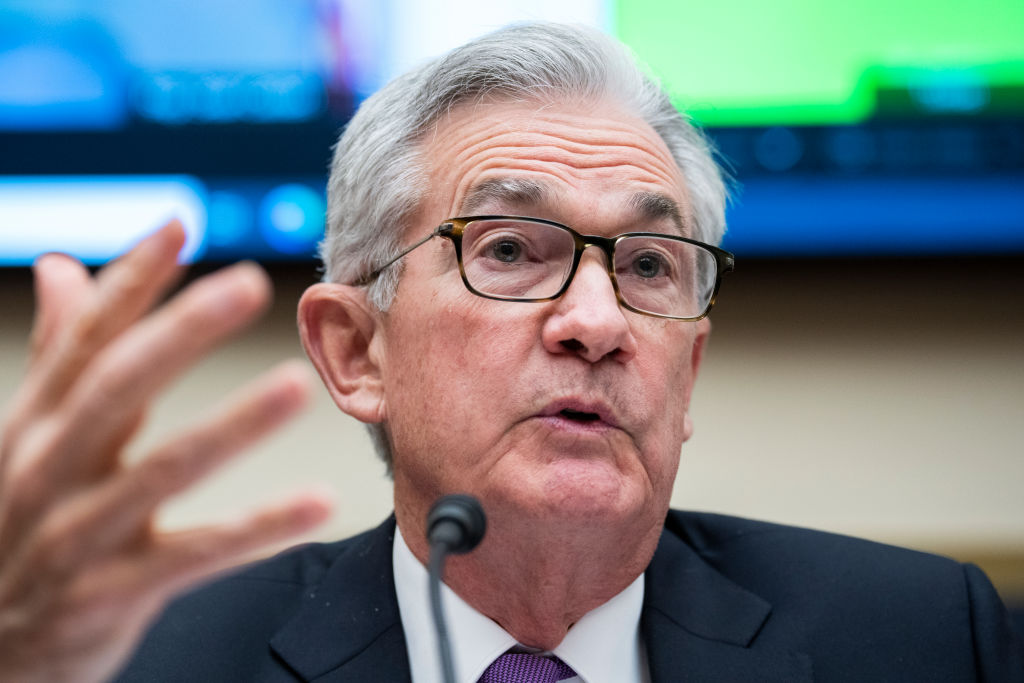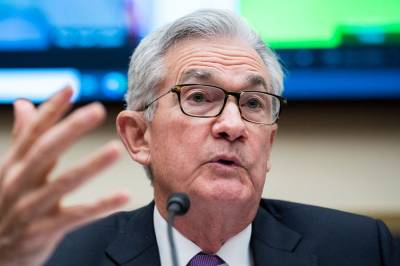Happy Thursday! Exactly 248 years ago tonight, a group of American colonists snuck onto some British ships and dumped nearly 350 barrels of tea into the Boston Harbor.
Damn Sons of Liberty and their lack of respect for private property.
Quick Hits: Today’s Top Stories
In an effort to rein in inflation, the Federal Reserve on Wednesday signaled it expects to raise interest rates three times in 2022 and announced it will accelerate its tapering of monthly asset purchases. “We are phasing out our purchases more rapidly because with elevated inflation pressures and a rapidly strengthening labor market, the economy no longer needs increasing amounts of policy support,” Federal Reserve Chair Jerome Powell said.
The chances of the Senate passing the Build Back Better Act by Christmas continue to dwindle as Democratic Sen. Joe Manchin remains steadfast in his opposition to certain portions of the legislation as currently constructed. President Biden said yesterday he “hopes” to sign the legislation into law by the end of the year, but later suggested congressional Democrats could pivot to focus on federal voting legislation in the near term. Democratic Sen. Kyrsten Sinema, however, reiterated Wednesday she does not support doing away with the legislative filibuster to pass elections reform, meaning any voting legislation would require the support of 10 Republican senators.
The Census Bureau announced Wednesday that U.S. retail sales increased 0.3 percent in November month-over-month, lagging behind inflation over the same time period and representing a marked slowdown from October’s 1.8 percent growth. The figure was still 18.2 percent higher than November 2020’s, but the deceleration in growth could reflect consumer concerns over inflation.
Dr. Anthony Fauci told reporters yesterday the Biden administration does not believe a variant-specific COVID-19 vaccine booster is needed to protect against Omicron. “The Omicron variant undoubtedly compromises the effects of a two-dose mRNA vaccine-induced antibodies and reduces the overall protection,” he said. “[But] considerable protection still maintains against severe disease. The early in vitro and clinical studies that I mentioned indicate that boosters reconstitute the antibody titers and enhance the vaccine protection against Omicron.”
The Senate voted 88-11 on Wednesday to advance the approximately $770 billion National Defense Authorization Act to President Biden’s desk. The package for fiscal 2022 raises military pay 2.7 percent, creates an independent commission tasked with investigating the duration and end of the war in Afghanistan, increases aid to Ukrainian security forces, and updates how sexual assault in the military is addressed.
The International Atomic Energy Agency said Wednesday it had reached an agreement with the Atomic Energy Organization of Iran to reinstall surveillance cameras at the Karaj centrifuge manufacturing site that had been removed earlier this year. The move comes amid multilateral negotiations to revive the 2015 Joint Comprehensive Plan of Action that have run into roadblocks in recent weeks.
President Biden on Wednesday amended his recent Kentucky disaster declaration to make additional federal aid available to the state as it seeks to recover from last weekend’s devastating tornadoes.* “I intend to do whatever it takes, as long as it takes, to support your state, your local leaders,” Biden said during a stop in Dawson Springs, Kentucky, yesterday. Biden has approved disaster declarations in Illinois and Tennessee this week as well.
The Federal Reserve’s Pivot Is Complete

If, a year from now, inflation has cooled from its current 39-year highs and price stability has returned, yesterday will, in many ways, have marked the beginning of the end.
Following its final Federal Open Markets Committee (FOMC) meeting of the year, the Federal Reserve on Wednesday announced plans to accelerate the tapering of its monthly bonds and securities purchases and signaled that as many as three interest rate hikes could be in the offing in 2022.
“There’s a real risk now … that inflation may be more persistent and that may be putting inflation expectations under pressure, and that the risk of higher inflation becoming entrenched has increased,” Federal Reserve Chair Jerome Powell told reporters. “I think that’s part of the reason behind our move today, is to put ourselves in a position to be able to deal with that risk. And I think we are in a position to deal with that risk.”
The suite of monetary policy changes revealed yesterday represents the culmination of a remarkable pivot by the Federal Reserve over the past few months. As recently as September, a plurality of FOMC participants didn’t foresee any interest rate hikes until 2023, and just six weeks ago, Powell was still attributing most of the inflationary pressure to supply chain disruptions outside of the Fed’s control. But in the few weeks since Thanksgiving, the central bank chair had devoted much of his public commentary toward hinting that a shift was coming.
In his post-meeting press conference Wednesday afternoon, Powell outlined the three data points that led to his change of heart: A third-quarter spike in the employment cost index, U.S. employers adding 531,000 jobs in October, and inflation hitting a 31-year high in October. “It was essentially higher inflation and faster—turns out much faster—progress in the labor market,” he said, expressing concerns about a wage-price spiral. “We don’t see this yet, but if you had something where real wages were persistently above productivity growth, that puts upward pressure on firms and they raise prices.”
Under the Fed’s updated schedule, its current quantitative easing (QE) program—which has more than doubled the central bank’s balance sheet since it was first announced in March 2020 in an effort to keep a locked down economy afloat—will phase out entirely in March 2022, three months earlier than originally planned. Once that’s completed—and the FOMC assesses maximum employment to have been reached—the Fed could begin hiking its target interest rate, which is currently near zero, in quarter-percentage increments until it reaches roughly 2 percent by the end of 2024.
That second benchmark—maximum employment—is a bit of a moving target nowadays. “We’ve never been particularly good at measuring maximum employment, even in normal times,” said Brendan Walsh, principal at Markets Policy Partners. “This time, you have so many people out of the workforce. The unemployment rate isn’t really 4.5 percent. It’s maybe 7.5 percent, or maybe it’s 5.5 percent. But we don’t really know what the denominator is anymore. You could have a huge amount of people re-enter [the workforce], or they may stay out.”
Officially, the unemployment rate has fallen from its pandemic-high of 14.8 percent in April 2020 to just 4.2 percent last month. But the labor force participation rate has settled in at a level about 2 percentage points below where it was in February 2020, and approximately 4 million fewer people are working now than in pre-pandemic times. Still, Powell indicated multiple times yesterday he believes the U.S. is rapidly approaching something resembling maximum employment.
“We’re not going back to the same economy we had in February of 2020,” he told reporters. “The post-pandemic labor market and the economy in general will be different. And the maximal level of employment that’s consistent with price stability evolves over time.”
The Fed issued updated economic projections alongside its policy prescriptions and—although Powell told lawmakers last month it was time to retire the word “transitory” when it comes to inflation—most FOMC members still see the phenomenon abating relatively quickly, with the median personal consumption expenditure inflation estimate falling from 5.3 percent in 2021 to 2.6 percent 2022 to 2.3 percent in 2023. The latter two approximations fall within shouting distance of the Fed’s 2 percent annual target.
“It looks like these price pressures will persist for six months,” Justin Wolfers—public policy and economics professor at the University of Michigan—told The Dispatch. “And I think [the Fed] didn’t hold their nerve on whether they could keep using the word transitory for six months. … The thing that’s striking to me is that the main view is inflation gets back to being boring really soon.”
The S&P 500 and Dow Jones Industrial Average were both in the red for most of the day Wednesday, but surged during Powell’s press conference to finish the day up 1.63 and 1.08 percent, respectively.
Ethiopian Civil War Rages On
More than 400 days after fighting broke out between Ethiopian Prime Minister Abiy Ahmed’s federal government and Tigrayan forces, civil war rages on in the country once thought to be an island of stability in East Africa. Despite efforts by the international community to push for a negotiated settlement between the two sides, the conflict—marred by civilian massacres, gender-based violence, aid blockades, and ethnic cleansing—shows few signs of abating.
As we wrote at the time, violence began in earnest in November 2020, when the Ethiopian government began its offensive into Tigray and assumed control of its regional capital, Mekelle, after an eruption of existing political tensions between the Tigrayan People’s Liberation Front (TPLF) and Abiy’s centralized government. In the months that followed, Ethiopian forces—and Abiy-aligned Eritrean government troops—faced accusations of “genocide” and “crimes against humanity” against the Tigrayan people.
The Ethiopian government also, according to some reports, blocked United Nations food aid distributions to the northern region. Resolution 2417—unanimously adopted by the Security Council in 2018—classifies the denial of food aid as a war crime. A U.N. World Food Program (WFP) report in early June found that more than 4 million people in Tigray faced severe hunger, with 350,000 of them at risk of famine.
Over the summer, however, Tigrayan fighters took back Mekelle, forcing the retreat of government forces and pushing Abiy to declare a unilateral ceasefire. The TPLF rejected the ceasefire and pushed the frontlines further south. When we wrote to you about the conflict last month, the TPLF had advanced toward the country’s capital of Addis Ababa after joining forces with a rebel group made up of Oromo fighters, presenting the government with a multifront war.
Abiy’s forces have thus far succeeded in keeping the dual offensives from reaching the capital, but the fighting continues—primarily in the Amhara region, where cities and towns have changed hands between the government and aligned Amhara militias on one side and TPLF fighters on the other. Reports emerged Sunday that Tigrayan fighters had retaken the historic town of Lalibela, home to a UNESCO World Heritage site, sparking local concerns about retribution by the rebel group.
The worries are far from unfounded. A Human Rights Watch report released last week documented about 50 civilian executions at the hands of Tigrayan forces between August 31 and September 9 of this year in Amhara’s towns of Chenna and Kobo. Tigrayan forces have also been accused of looting food stores, sometimes at gunpoint, leading the WFP to suspend food deliveries to Kombolcha and Dessie in Amhara.
“Lots of different groups of civilians have been targeted, and there’s not a particular force that you can call out as innocent right now,” Emily Estelle of the American Enterprise Institute’s Critical Threats Project told The Dispatch. “It is difficult to verify all of the accusations, and that will take some time, but forces on either side of the conflict have been credibly accused of harming civilians.”
With neither side willing to lay down its arms, there’s very little foreign countries can do to meaningfully intervene—at least for now. “As far as an international role going forward, I think it’s challenging because neither the Tigrayan leadership nor Abiy’s government has expressed any real interest in negotiations yet,” Estelle said. “Fundamentally, while the war is still going on, it’s difficult to see what levers the international community has to use in the immediate [term].”
Worth Your Time
There are a pair of pieces up at National Review about the recent January 6 Select Committee disclosures. First, Kevin Williamson makes the case that comparing January’s Capitol riot with the riots that subsumed American cities in the summer of 2020 is a false equivalence. “There were 21,570 homicides in the United States in 2020. If one of the victims had been the president of the United States, we would have made a pretty big deal about it,” he writes. “What has been clear to some of us for a long time—and what is becoming more difficult to deny every day—is that the events of January 6 were part of an attempted coup d’état. … A riot that is part of a coup d’état is not very much like a riot that is part of a coup de Target.” Second, Michael Brendan Dougherty looks at how right-wing narratives about that day have shifted over the past year. “In the months after January 6, the politically correct move for Trump’s cable-news apologists has been to ignore the fact that the people who set about ‘investigating’ the supposed vote fraud have turned up nothing of consequence or merit,” he writes. “But the riot at the Capitol happened because President Donald Trump simply lied, and lied, and lied. … Treating Trump like a baby whose feelings had to be coddled at the end resulted in Ashli Babbitt’s getting shot as she tried to break into Congress against a lawful order to desist. He could no more Stop the Steal than make Mexico pay for the wall. But, pay for his actions? Some people did.”
Megan McArdle’s latest Washington Post column is a thoughtful assessment of the current punitive measures facing the unvaccinated. “In some cases, yes, there are clearly valid reasons to treat the unvaccinated differently from the vaccinated, and possibly effective ways to do so. When unvaccinated people impose substantial, direct and unnecessary costs on others, it’s fair to impose rules that limit the damage or recoup those costs,” she writes. “But such policies have to be proportionate to actual risk, not merely punitive. … The best defense of the punitive instinct is that more people might get jabbed if we make it sufficiently costly not to resist. But at this point we’ve reached a hard core of refusers who are not merely a little hesitant, but apparently happy to risk their lives rather than take a shot. If the possibility of dying doesn’t faze them, how likely are they to respond to lesser threats? And if the answer is ‘not very,’ can we really justify punishing them anyway?”
Presented Without Comment
Also Presented Without Comment
Toeing the Company Line
When Jonah kicks off a G-File with “Screw it,” you know it’s going to be a good one. Writing about the messages that Fox News hosts sent to Mark Meadows on January 6, Jonah argues that “the central truth of the texts isn’t that what the mob was doing was condemnable, but that Trump was responsible for the condemnable behavior.” He continues: “A ‘law and order’ conservatism that says, ‘As long as liberals fail to condemn thuggish violence for their side, we feel no obligation to condemn thuggish violence on our side,’ cares neither about law and order nor conservatism.”
This week’s Capitolism (🔒) focuses on U.S. sugar policy and the ongoing labor disputes at Kellogg’s. “You and I—and small businesses—don’t have much choice when it comes to paying the U.S. sugar tax,” Scott Lincicome writes. “But large, multinational manufacturers sure do. And instead of ponying up, they’re voting with their feet—to American workers’ detriment.”
On Wednesday’s Dispatch Podcast, Sarah, Steve, Jonah, and David discuss the latest moves by the January 6 Select Committee, all that we’ve learned about the Omicron variant, and whether journalists are treating President Biden unfairly.
On the site today, Chris Stirewalt also addresses the texts to Mark Meadows from Fox News personalities. “What is noteworthy, though, is the difference between what they told Meadows and what they told their viewers,” he writes.
Gregg Girvan digs into the long-term care provisions of the Build Back Better Act and finds them wanting.
Weifeng Zhong explains how China could use open-source information provided by its telecom giants to gain an intelligence edge over the West.
Let Us Know
Economists have suggested one reason U.S. retail sales growth slowed in November was because Americans had shifted their holiday shopping to earlier in the year. Are you done with your holiday shopping already?
(This is absolutely not a plug for Dispatch gift memberships, which are impervious to supply chain disruptions, resistant to inflationary pressures, and generally great for last-minute giving.)
Reporting by Declan Garvey (@declanpgarvey), Andrew Egger (@EggerDC), Charlotte Lawson (@lawsonreports), Audrey Fahlberg (@AudreyFahlberg), Ryan Brown (@RyanP_Brown), Harvest Prude (@HarvestPrude), and Steve Hayes (@stephenfhayes).
Correction, December 16, 2021: Kentucky was hit by a series of tornadoes last weekend, not hurricanes.







Please note that we at The Dispatch hold ourselves, our work, and our commenters to a higher standard than other places on the internet. We welcome comments that foster genuine debate or discussion—including comments critical of us or our work—but responses that include ad hominem attacks on fellow Dispatch members or are intended to stoke fear and anger may be moderated.
With your membership, you only have the ability to comment on The Morning Dispatch articles. Consider upgrading to join the conversation everywhere.